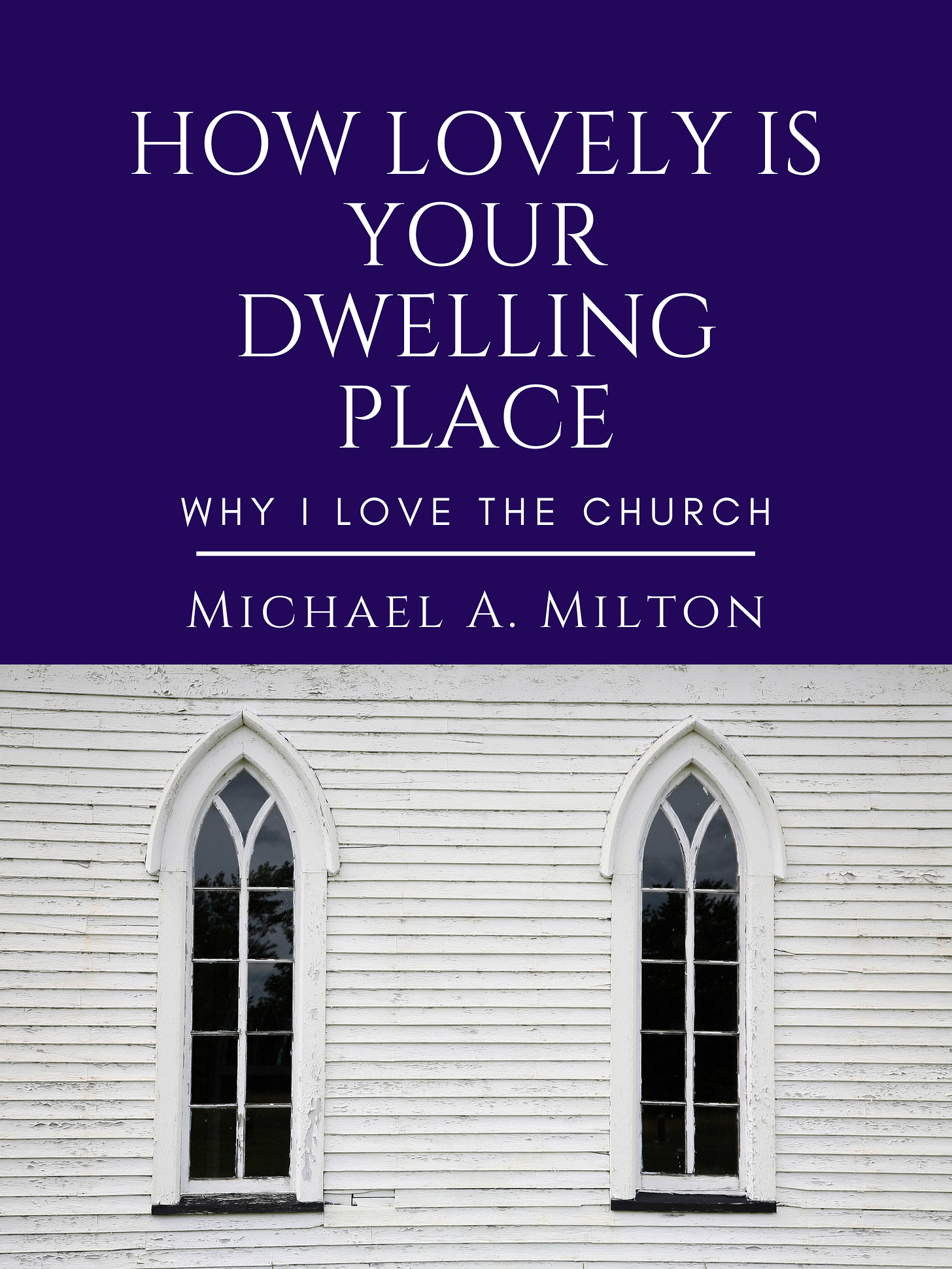Wrong Addresses: How the Search for Home can Become a Dead End
Another Installment in "How Lovely is Your Dwelling Place"
It’s possible to follow the well-intended directions of others and still arrive at the wrong address. Their understanding of home differs from ours. Many have settled for the places they found, but we don’t have to. We know of a home that transcends all earthly longings.
We have been studying Psalm 84, but we may add these parallel passages:
“O LORD, I love the habitation of your house and the place where your glory dwells. Do not sweep my soul away with sinners, nor my life with bloodthirsty men, in whose hands are evil devices and whose right hands are full of bri es. But as for me, I shall walk in my integrity; redeem me, and be gracious to me. My foot stands on level ground; in the great assembly I will bless the LORD” (Psalms 26:8-12).
“Let not your heart be troubled: ye believe in God, believe also in me. In my Father's house are many mansions: if it were not so, I would have told ou. I go to prepare a place for you. And if I go and prepare a place for you, I will come again, and receive you unto myself; that where I am, there ye may be a so. And whither I go ye know, and the way ye k ow. Thomas saith unto him, Lord, we know not whither thou goest; and how can we know the way? Jesus saith unto him, I am the way, the truth, and the life: no man cometh unto the Father but by me” (John 14:1-6 KJV).
“Home” is an intuitive human impulse for a destination we have never known. The truth is present in much of our Western Literature. And so many of us will remember this famous line: “Click your heels and say, ‘There’s no place like home . . .’”
When authors’ words strike the emotional chord of universal humanity, they get our attention. That is why we remember that line so very well. Observations stored in the archives of the mind with sensory experience are recorded with permanent ink. In Frank Baum’s (1856-1919) classic The Wonderful Wizard of Oz. Glinda, “the good witch of the North,” instructs Dorothy to click her heels thrice, saying, “There’s no place like home.” Magically, Dorothy awakes in her bed, her home, and dear old Kansas. It is said to have been one of the most emotional moments in film history. This is undoubtedly so because each of us has a longing for home, which cannot be fully realized with a “MacMansion” in this life. A home is more than a house. Home is the place where you belong.
The feeling of longing for home is, indeed, a universal one. People in 2022 BC or 2022 AD understand the visceral ache for home, whether in Chennai or Cornwall. I know that feeling, too. As one grows older, one experiences a unique longing for a home that is both familiar and new. Dr. Craig Barnes wrote that home “. . . is the memory of Eden, written on every newborn soul, that makes us discontented with the place where we are.” ”1
We cannot make peace with enemies to avoid conflict with friends, and we cannot find acceptance with people of unbelief, though we may be rejected by persons of faith. —M. A. Milton
So, what does longing for home mean to you?
David had longed for home. In Psalm 26:8, King David states, “Lord, I have loved the habitation of Your house And the place where Your glory dwells.” David’s cry for home is set against the harsh realities of isolation from God, the opposite of home. It is the “far country.” Life without God is the Waste Land of T.S. Eliot: “. . . mixing memory and desire . . .” (Eliot, Waste Land, 1922).
Consider David’s flight to Gath, one of the five major cities in the land of the Philistines. The shepherd, who would be king, sought refuge in the birthplace of Goliath to escape the murderous madness of Israel’s King Saul. But did he not trade trials for troubles?
Then David said in his heart, “Now I shall perish one day by the hand of S ul. There is nothing better for me than that I should escape to the land of the Philistines. Then Saul will despair of seeking me any longer within the borders of Israel, and I shall escape out of his hand” (1 Samuel 27:1 ESV).
So what happened?
“And Achish said to the commanders of the Philistines, “Is this not David, the servant of Saul, king of Israel, who has been with me now for days and years, and since he deserted to me I have found no fault in him to this day.”
But the commanders of the Philistines were angry with him. And the commanders of the Philistines said to him, “Send the man back, that he may return to the place to which you have assigned him. He shall not go down with us to battle, lest in the battle he become an adversary to us. For how could this fellow reconcile himself to his lord? Would it not be with the heads of the men here? Is not this David, of whom they sing to one another in dances, “Saul has struck down his thousands, and David his ten thousands’?”
Then Achish called David and said to him, ‘As the Lord lives, you have been honest, and to me it seems right that you should march out and in with me in the campa gn. For I have found nothing wrong in you from the day of your coming to me to this ay. Nevertheless, the lords do not approve of u. So go back now; and go peaceably, that you may not displease the lords of the Philistines.’ And David said to Achish, ‘But what have I d ne? What have you found in your servant from the day I entered your service until now, that I may not go and fight against the enemies of my lord the king?’ And Achish answered David and said, “I know that you are as blameless in my sight as an angel of od. Nevertheless, the commanders of the Philistines have said, “He shall not go up with us to the battle.” Now then rise early in the morning with the servants of your lord who came with you, and start early in the morning, and depart as soon as you have light.” So David set out with his men early in the morning to return to the land of the Philisti es. But the Philistines went up to Jezreel” (1 Samuel 29:3-11).
David traded home with God for residence with evil. David’s directions were off. David had the wrong address. He thought “home” meant safety. We are not homeward-bound when we run from the call of God. Even the world will know this. As surely as the pagan sailors threw Jonah overboard in his running from God (Jonah 1:1-15), and the Philistines rejected David, so, too, will the world reject us. We cannot make peace with enemies to avoid conflict with friends. We cannot find acceptance with people of unbelief, though we may be rejected by persons of faith. Christ-redeemed people will never be at rest in the company of those who defy the Lord. Gath will be destroyed (2 Kings 12: 7). Jerusalem remains.
So, why do we long for home? There are at least three reasons.
I. Home with God is the refuge we seek.
“Habitation” (verse 8) in the presence of God is the ultimate “safe house.” God’s glory draws us into a love we could never imagine. God’s glory is perfectly expressed in the Person of our Savior, Jesus Christ. To follow Him is to make the decisive turn towards the home you crave.
Psalm 84:10 (ESV): “For a day in your courts is better than a thousand elsewhere. I would rather be a doorkeeper in the house of my God than dwell in the tents of wickedness.”
John 14:2-3 (ESV): “In my Father’s house are many rooms. If it were not so, would I have told you that I go to prepare a place for you? And if I go and prepare a place for you, I will come again and will take you to myself, that where I am you may be also.”
II. Home with God is the reality we desire.
Home with God is an experience of fulfillment and contentment. It’s the place we have longed for and the fullness of the pretended places we have tried to call home. Israel in the wilderness had to learn that home was not the place they left or even the Promised Land they were going to. Home is where God is. And that is where we want to be.
Psalm 90:1 (ESV): “Lord, you have been our dwelling place in all generations.”
2 Corinthians 5:1 (ESV): “For we know that if the tent that is our earthly home is destroyed, we have a building from God, a house not made with hands, eternal in the heavens.”
III. Home with God is the redemption we need.
David writes, “Redeem me and be merciful to me” (Psalm 26: 1). The places where David chose to live were inevitable. There is no mercy in the harsh wastelands of disobedience. Religion could offer David no hope. Home is not where we pay to get in. Home is where we are welcomed by the love and acceptance of a God who fulfills what He requires.
Psalm 23:6 (ESV): “Surely goodness and mercy shall follow me all the days of my life, and I shall dwell in the house of the Lord forever.”
Ephesians 2:8-9 (ESV): “For by grace you have been saved through faith. And this is not your own doing; it is the gift of God, not a result of works, so that no one may boast.”
Summary
We have learned some essential biblical lessons about home: A home is a place of refuge, an environment we crave, a reality we want, and the house of redemption we need. But what does this mean to you today?
If you are sensing that longing for home and every place you have moved has only left you empty, do not despair. God is mercifully leading you to see that He is the home you seek. That message is as relevant to believers as to unbelievers. We can all lose our way and end up at the wrong address. As I grow older and feel the effects of a disease guiding me toward an unfamiliar path in life, I find solace in knowing that my home is secure. I am safe within that home. The resurrected and reigning Christ is my home.
Philippians 3:20-21 (ESV): "But our citizenship is in heaven, and from it we await a Savior, the Lord Jesus Christ, who will transform our lowly body to be like his glorious body, by the power that enables him even to subject all things to himself."
And for you? Today is a day of salvation, a chance to reroute your life. You are only a prayer away from finding the home you seek. Please pray with me: “Redeem me. Be merciful to me. Forgive and receive me for the sake of Your resurrected Son, Jesus. Amen.”
Only then can we truly understand, “There is no place like home.”
Footnotes
1. Barnes, Searching for Home, 2003, 14
Questions for Reflection
I prepared these three questions to guide you (or your family, or group, or Sunday School class) into deeply contemplating your relationship with God, the nature of true safety and fulfillment, and the journey toward embracing the eternal home God offers to all who seek Him.
1. The Refuge of God’s Presence:
Considering the assertion that our ultimate “safe house” is the habitation in the presence of God, reflect on moments when you have experienced this refuge amidst life’s storms. How does finding refuge in God contrast with the world’s offers of safety and security? Meditate on how God’s presence has been a shelter for you and how this understanding might deepen your pursuit of His presence in daily life.
2. The Reality and Fulfillment of Being Home with God:
The chapter suggests that our true home is not a physical location but the experience of God’s presence, where we find fulfillment and contentment. Reflect on your own experiences of searching for belonging and the moments you have felt “at home” with God. How do these moments compare with worldly pursuits of fulfillment? Consider how this understanding of being home with God shapes your priorities, desires, and actions.
3. The Redemption and Mercy of God as Our Ultimate Home:
David’s plea for redemption and mercy highlights our deep need for a home that is not earned but graciously given by God. Reflect on your journey toward understanding home as a place of divine mercy and acceptance. How does recognizing your need for God’s redemption change your perspective on spiritual wandering and the longing for h me? Contemplate the ways in which accepting God’s mercy and love invites you into the true home He has prepared for you through Jesus Christ.
Let us pray:
O Lord of all, who sent Thy Son to fulfill the Covenant of Works—that perfect obedience brings heaven and disobedience results in hell—and offer the Covenant of Grace—that by repenting and believing that Jesus of Nazareth is the perfect Son of God, fulling divine and yet fully human, who died for our sins on the cross and rose again from the dead, seen by hundreds at once, then, ascending into heaven, validating His life and offering hope to a lost world—come into our lives today and lead us to the home we long for, the home we need. Thou O Christ art our home. In Thy name, I pray. Amen.
Craig Barnes, Searching for Home, 2003, 14
Next week, we will consider the final installment in this series. You will then receive your free ebook, How Lovely is Your Dwelling Place. Thank you so much for being a part of this little study. O how I pray that the Spirit of the living God encourages you, strengthens you, and leads you all the way home.






